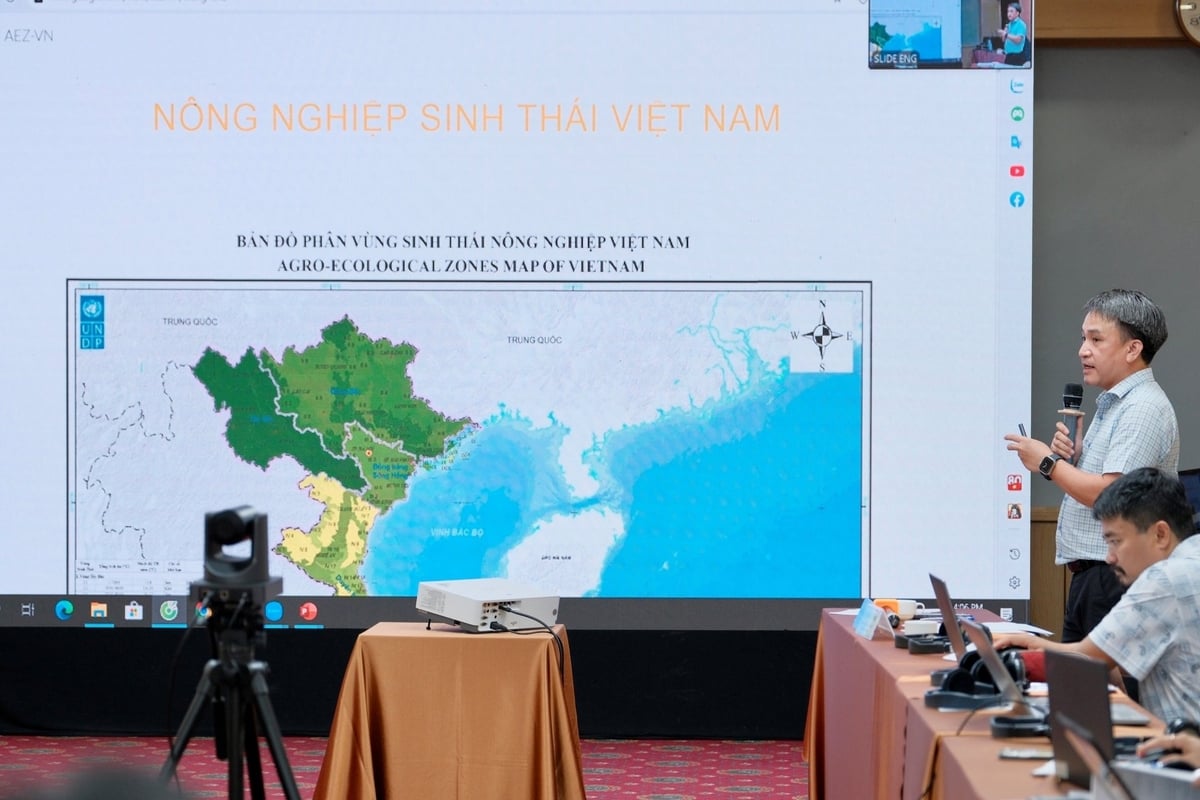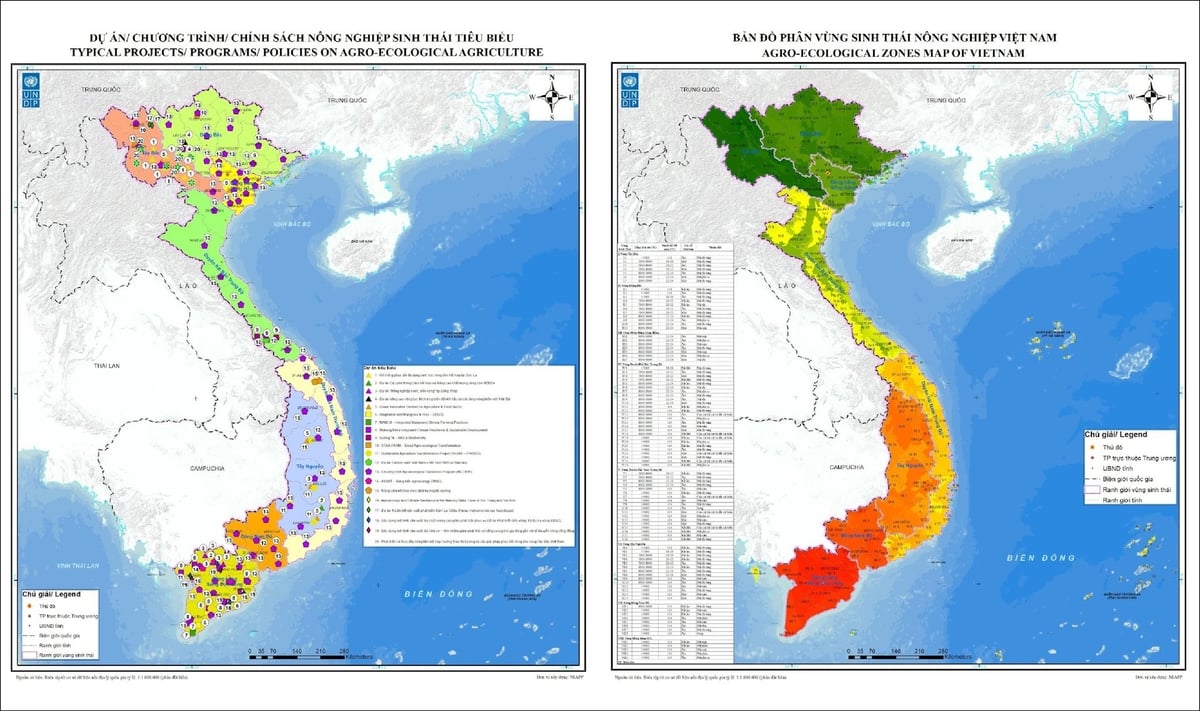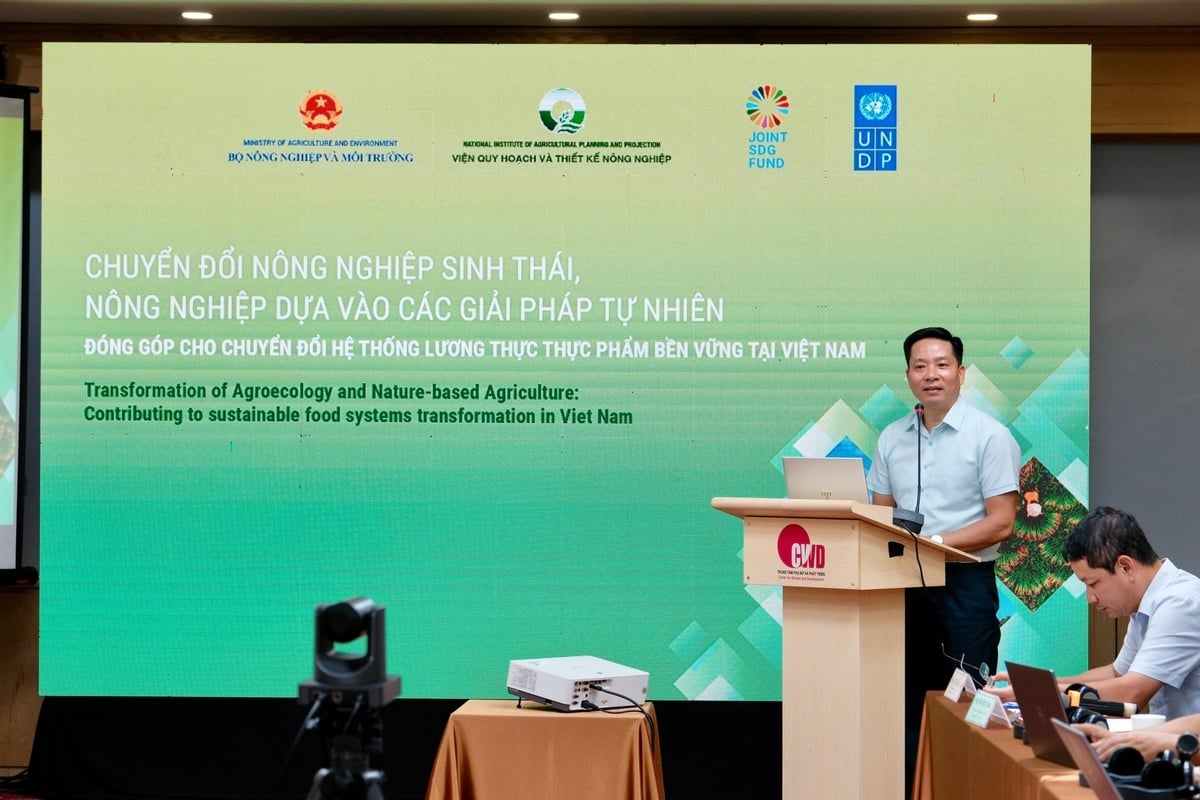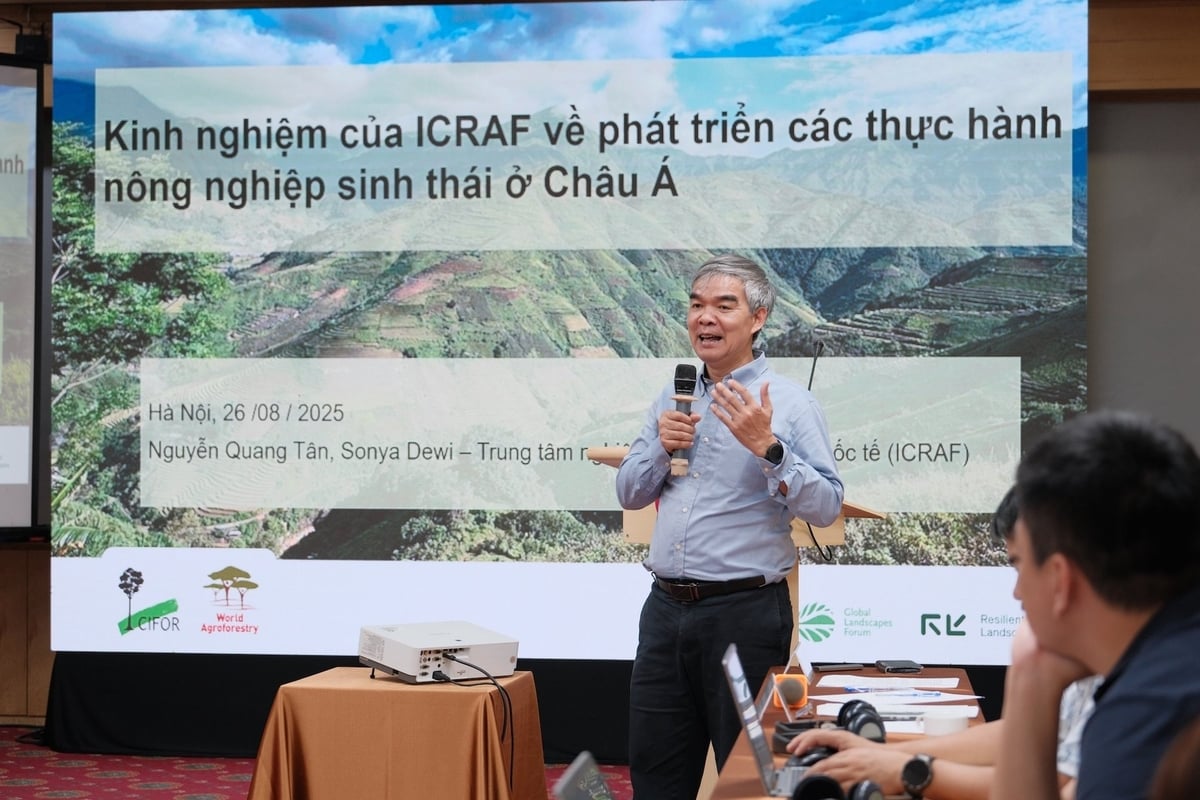December 18, 2025 | 20:11 GMT +7
December 18, 2025 | 20:11 GMT +7
Hotline: 0913.378.918
December 18, 2025 | 20:11 GMT +7
Hotline: 0913.378.918
The Ministry of Agriculture and Environment (MAE) and the UNDP in Viet Nam recently co-organized a technical consultation workshop on “Transformation of Agroecology and Nature-based Agriculture: Contributing to sustainable food systems transformation in Viet Nam”, hosted by the National Institute of Agricultural Planning and Projection (NIAPP). The activity is within the framework of the Joint United Nations Programme in Vietnam (Joint SDG) on Promoting innovation in partnership mechanisms and financing for the transformation of food system in Viet Nam (MPTF Joint Programme), implemented by the UNDP in coordination with UN organizations.
The workshop was held in a hybrid format, bringing together around 100 participants, including representatives from management agencies; experts and scientists in agriculture and environment; research institutions from the scientific, social, and non-governmental sectors; as well as businesses, cooperatives, and farmers in Viet Nam.

NIAPP Deputy Director Bui Hai Nam shares the results of "Assessment of Agroecological and Nature Based Solutions in Agriculture for recommendations of effective scaling up in Viet Nam". Photo: Quynh Chi.
NIAPP 's study applied a two-tiered approach: (1) a systematic review and (2) a structured survey of 275 agroecological projects implemented since 2010. Initial findings show that after Viet Nam pledged to achieve net-zero emissions at COP26 in 2021, the number of agroecological intervention projects rose sharply, though their distribution has been uneven.
The Mekong Delta and Red River Delta host the largest number and highest concentration of projects, while the Southeast has the fewest. A key finding of the study is the paradox of “thick policies – thin technologies” in efforts to transform food systems through agroecological and nature-based solutions (NbS) in Viet Nam.
According to Mr. Bui Hai Nam, Deputy Director of NIAPP and lead of the expert group: “Projects remain heavily dependent on external resources (bilateral and multilateral ODA), while contributions from the state budget and the private sector are still limited.”
“Most intervention projects emphasize mechanisms and policies but lack concrete technical guidelines for practical application at the local level. In other words, new solutions are being promoted ‘top-down,’ while the technical foundation at the farm level has not received adequate attention,” he added.
NIAPP recommends that the agriculture and environment sectors institutionalize “public–private–community partnerships” (PPP+C), recognizing communities as equal partners. This approach would encourage the extension system to provide specialized advisory services tailored to farmers’ needs and local ecological conditions, while also strengthening community-based extension capacity.

Project survey result shows strong acceleration of agroecology projects in time but very different in space. Source: NIAPP.
In Viet Nam, agriculture plays a vital role in ensuring food security, sustaining livelihoods for over 60% of the population, and contributing around 12% of the national GDP (2024).
However, the sector faces both internal and external challenges: small-scale farming, resource depletion, climate change, volatile markets, and shifting global consumption trends.
Speaking at the workshop, Mr. Vu Thanh Liem, Deputy Director of the International Cooperation Department (MAE), emphasized that agroecology is regarded as a key solution, closely aligned with the sector’s major development strategies.
“This approach helps optimize the relationship between agricultural production and biodiversity conservation, strengthen ecosystem resilience, and reduce greenhouse gas emissions. To translate these orientations into practice, we need concrete operational tools and a realistic roadmap,” Mr. Liem stated.
From the UNDP perspective, Mr. Vu Thai Truong, Head of the Climate Change, Energy and Environment Unit, noted that the adoption of agroecological models remains fragmented and lacks strong financial and policy mechanisms for scaling up.
“With UNDP’s support, NIAPP’s review of agroecological models will help identify the main barriers and enabling factors for ecological transformation. This will directly contribute to the roadmap for implementing Viet Nam’s National Action Plan on Food Systems Transformation,” Mr. Truong said.

Mr. Vu Thai Truong, Head of Climate Change, Energy and Environment, UNDP in Vietnam, addresses the workshop. Photo: Quynh Chi.
The Center for International Forestry Research and World Agroforestry (CIFOR-ICRAF), drawing on its experience in technology transfer to farmers, introduced agroecological models in India, the Philippines, Indonesia, and Viet Nam.
Mr. Nguyen Quang Tan, National Coordinator of ICRAF in Viet Nam, introduced the concept of a “value chain ecosystem,” applying the “agro-ecological landscape” and “agroforestry” approaches. Technical interventions are designed to help farmers reduce the use of chemical fertilizers and pesticides, while strengthening their capacity to manage nutrient cycles more sustainably.
Sharing her experience from Muc Dong Farm, founder and CEO Nguyen Thi Thinh said that her greatest motivation is building trust so that more people feel confident to embark on meaningful ecological and circular agriculture projects.
Starting with only 13 cows, Ms. Thinh adopted her own “five no’s” farming principle. This commitment helped Muc Dong become one of the first farms in Viet Nam to receive organic certification from Japan in 2021.
“Circular agriculture is not unfamiliar to us – farmers have practiced it for generations. But with the rise of chemical use, our environment has suffered serious impacts. It is time to sound the alarm so that cooperatives can boldly move toward sustainability,” she shared. At Muc Dong, cow manure is processed into vermiculture, not only serving the farm’s own needs but also supplying local producers with materials to transition toward organic farming.

ICRAF National Coordinator in Vietnam Nguyen Quang Tan shares CIFOR-ICRAF's experience in implementing technical projects in Asia. Photo: Quynh Chi.
Contributing his expertise to the discussion, Associate Professor Dr. Dao The Anh praised the efforts of NIAPP and the support of UNDP in conducting this study. The report on 275 agroecological programs and projects is comprehensive, highlighting system gaps and offering well-grounded recommendations.
“Agroecology is interdisciplinary and has already been mainstreamed into Decision 300/QD-TTg declaring the National Action Plan of Food Systems Transformation. Therefore, future research should build on the National Action Plan as a legal foundation, thereby supporting provinces and cities to concretize their local action plans,” Dr. The Anh suggested.
According to Mr. Nguyen Thuc Thi, Deputy Director of the Institute for Agricultural and Rural Planning (under the Vietnam Union of Science and Technology Associations), Viet Nam has gone through a stage of prioritizing “enough to eat” to meet basic living needs. To align agriculture more closely with nature and move toward sustainability, he stressed the importance of addressing economic trade-offs. “When shifting to agroecology, farmers may initially face lower productivity and reduced income in the short term,” he noted.
Mr. Nguyen Manh Hiep, IUCN officer, analyzed the regional differences in the allocation of NbS projects. He pointed out that each region follows a distinct approach: policies in the Mekong Delta emphasize nature, livelihood improvement, and climate resilience, while northern provinces place greater focus on food safety and added value.
From the initial findings, the research project confirmed the effectiveness of multi-sectoral coordination in promoting green financial mechanisms, thereby contributing to food system transformation.
Experts proposed three pillars of recommendations to scale up ecological, nature-based agriculture in Viet Nam:
1. Innovating financial institutions and investment models;
2. Developing markets and ensuring transparent value chains;
3. Strengthening enforcement capacity and ensuring coherent implementation.
/2025/12/16/3554-1-192458_116.jpg)
(VAN) Minister Tran Duc Thang held a working session with the Viet Nam Seaculture Association to discuss solutions for developing marine farming in a methodical, industrial, sustainable, and well-organized manner.

(VAN) Trading forest carbon credits is to reduce greenhouse gas emissions while creating sustainable livelihoods for local communities.

(VAN) Expanding the area of forests with FSC certification creates a foundation for elevating the economic value of forests, promoting sustainable management, and offering opportunities to participate in the carbon credit market.

(VAN) MAE and GIZ organized the conference to strengthening capacity and readiness for EUDR implementation in Vietnam.

(VAN) When women, men, children, and people with disabilities all have the opportunity to maximize their potential, the economy will grow, and the country will prosper.

(VAN) Effective disaster prevention and the creation of sustainable livelihoods through practical forestry policies are the distinct and crucial values of special-use and protection forests.

(VAN) The policy movement regarding carbon emission reduction is opening up a new approach, linking national goals with practical agricultural production.